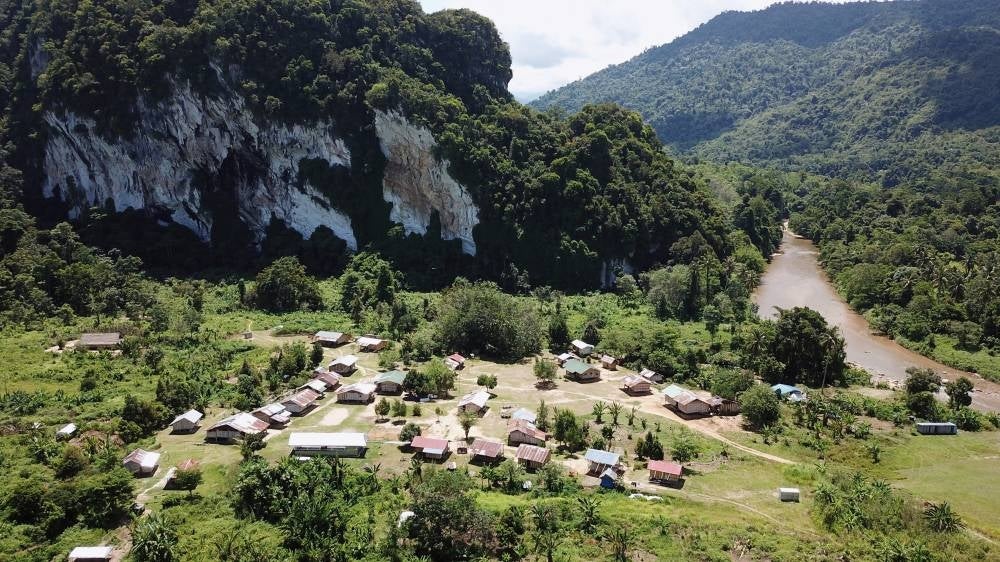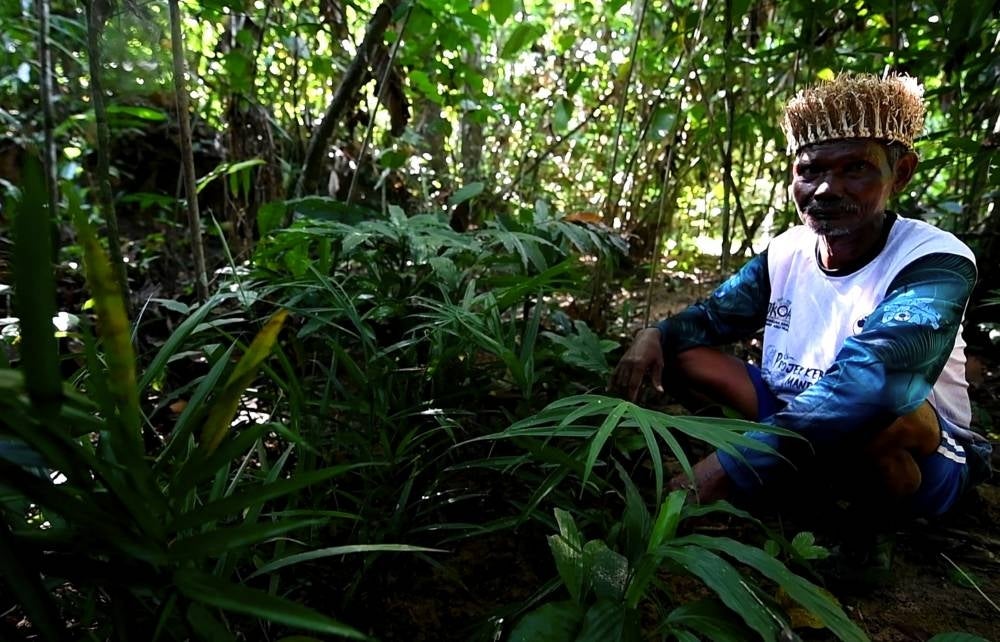Kg Bering Orang Asli all out to defend their Ancestral Land, Customs

A Bernama team comprising journalists Soon Li Wei, Wan Muhammad Aslah Wan Razali and Muhammad Mikhail Mohazar as well as cameraman Shahrizan Jefri Aziz recently took part in an expedition to the Kampung Kaloi and Kampung Bering Orang Asli villages in Gua Musang, Kelantan, organised in collaboration with Friends of the Earth Activists Association (KUASA).
This is the final of a two-part article delving into the impact of development and illegal logging on the two settlements. The expedition, a micro-grant project sponsored by Cent-GPS and the US Embassy in Kuala Lumpur, took place from June 11-16.
GUA MUSANG - It was the last day of the Bernama team's visit to Kampung Bering, an Orang Asli village located about 75 kilometres from here, and breakfast was served at the home of a village elder named Along bin Itam.
"Cak (which means 'eat' in the Temiar dialect)," Along, 73, said, inviting the visitors to help themselves to the fried rice, tea and boiled corn on the cob.
"Belej (delicious)," he said, pointing to the corn which was harvested from the Kebun Mandiri Orang Asli (#kebunmandiriOA), a community farm the villagers have been operating since March this year with the help of Friends of the Earth Activists Association (KUASA) and sponsored by Yayasan Hasanah and the Global Environment Facility. About 27 families belonging to the Temiar ethnic group dwell in Kampung Bering, most of whom forage for forest products to earn a living. They also practise farming and catch fish from the nearby Sungai Kenong.
Kampung Bering is part of Pos Pasik, which is surrounded by the Gunung Stong Selatan and Berangkat forest reserves in Kelantan's Jeli district.
FARM IN THE JUNGLE

Along himself has his own small farm located inside the jungle about 200 metres from their settlement. It took Along and the Bernama journalists about 30 minutes to trek to the farm which is situated across a stream. The fresh morning air and the beauty of the surrounding greenery motivated the team to trudge through the undergrowth and get to their destination.
On the way there earlier, Along pointed to a small cave in a nearby limestone hill, saying, "That's the place the 'orang besar' like to rest and hide!" He was referring to the wild elephants that often invade their village at night and destroy their property and crops.
He said he visits his farm, where he has cultivated various herbs, once every two or three days to clear the weeds and check on the plants.
"Those days when there were no logging activities near our settlement, we didn't have to plant herbs because there was an abundant supply in the forest. But now the loggers have come and cleared (parts of) the forest," he lamented.
Among the plants he has cultivated on his farm is a herb called mangsian (Phyllanthus reticulatus), the leaves of which have medicinal properties, according to Along.
"We boil the leaves and use it as a medicine to treat stomach ache and fever," he said.
Phyllanthus reticulatus grows in the wild and bears blackish purple-coloured fruit; it can grow to a height of 800 to 2,000 metres.
FOREST PRODUCTS DISAPPEARING FAST
Along said forest resources, which make up 90 percent of his community's livelihoods, are fast disappearing, no thanks to the logging activities in the area which started some 10 years ago. "Previously, we used the leaves of the bertam palm to make the roof for our homes as they are waterproof and shield us from the heat. But now these palm trees have completely disappeared from our forest.
"Now we are forced to use the aluminium roofing discarded by the loggers. What else can we do? The loggers have disturbed our forest area and shown disrespect to our customary land and we have lost so much (of our resources)," he said, his aged face frowning.
With the forest exploited by loggers, the wild elephants there are forced to forage for food in the nearby Orang Asli villages and farms.
Along said a long time ago, his grandfather had warned him that the forest they lived in would one day be swallowed by development.
"He advised us to cultivate whatever herbs we collect from the jungle to prevent them from becoming extinct," he recalled.
"In the past, it was so easy for us to collect valuable herbs such as kacip Fatimah and tongkat Ali from the forest here... we would go and pick them whenever there was a demand for these herbs. But that was a long time ago." Along is also worried about how his community would be able to keep their culture alive and celebrate traditional ceremonies such as Sewang when the forest no longer exists.
"We need the natural materials (collected from the forest) to celebrate Sewang. I'm sure our heritage and customs will be affected," he added.
PROTECT Fellow villager Angah a/l Pandak, 67, said some years back certain "outsiders" were taken in by Kampung Bering's scenic riverside location and offered them compensation in return for developing the place into an ecotourism site.
Suffice to say, the villagers politely declined the offer.
"We don't want any development here because this has been our customary land for generations. At that time, our village was unpolluted and the river water was still clear as not many people knew of our existence," said Angah.
Like many others in Kampung Bering, he hopes their forest will not fall prey to large-scale logging activities as he is worried about floods. The forest helps to soak up excess rainwater which prevents flooding.
"We don't want our beautiful village to be submerged in floodwaters and we don't know where to go in case our area is flooded," he added.
ORANG ASLI RIGHTS
Centre for Orang Asli Concerns founder Dr Colin Nicholas, meanwhile, said most of the Orang Asli communities in Gua Musang feel they have no say in development matters involving their ancestral land.
"For example, they are not consulted before a development project is implemented or someone wants to carry out large-scale logging activities. They (the companies) just offer compensation to those whose land is encroached.
"This is why the Orang Asli are feeling frustrated. They feel their rights are being suppressed and they are prevented from voicing their views to the authorities... all they want to do is protect their customs and heritage as well as the land that they (and their ancestors) have inhabited for over a hundred years," he said.
Colin said before a project is approved, environmental impact assessment (EIA) and social impact assessment (SIA) studies must be carried out by engaging with the local communities and other stakeholders.
"But the Orang Asli communities (in Gua Musang) claimed that the EIA and SIA reports were not done in accordance with the SOP (standard operating procedure)," he said.
He said although the Orang Asli practised a nomadic lifestyle, they tend to shift from one place to another within their own "territory".
"In Gua Musang, for example, there are 17 Orang Asli territories and among them are Balar, Bihai, Belatim, Pasik, Kuala Wias, Pulat and Hau. If the Orang Asli from Kampung Bering want to leave, they have to move to another place within the Pasik territory in line with their customs," he added.
KUASA chairman Hafizudin Nasarudin urged the authorities to gazette permanent forest reserves in Peninsular Malaysia as environmentally sensitive areas (categories one and two) under the National Physical Plan.
"In forests that fall under these two categories, no development is allowed except for controlled ecotourism activities as well as conservation, research and selective or sustainable logging activities," he said.
He said currently under the National Forestry Policy and Section 19 of the National Forestry Act 1984, the authorities may permit logging activities and the taking of forest produce such as timber and minerals from any permanent forest reserve. "But as environmental activists, we certainly don't agree with this as it will cause the disappearance of our original natural forest stands and destroy ecosystems, as well as lead to the extinction of various species due to the loss of habitats," he said. - BERNAMA














